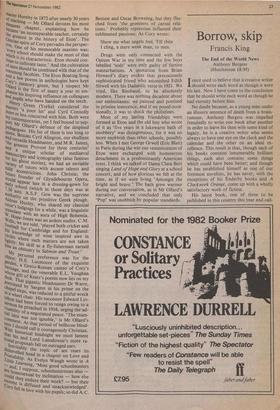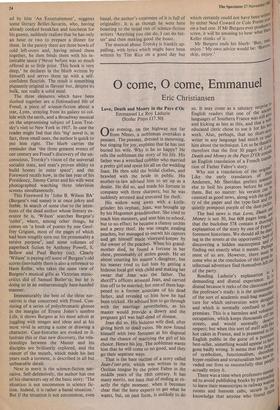Borrow, skip
Francis King
The End of the World News Anthony Burgess (Hutchinson £8.95)
Ionce used to believe that a creative writer should write each word as though it were his last. Now I have come to the conclusion that he should write each word as though he had eternity before him.
No doubt because, as a young man under an illusory sentence of death from a brain- tumour, Anthony Burgess was impelled frenziedly to write one book after another in order to leave his then wife some kind of legacy, he is a creative writer who seems always to have one eye on the clock and the calendar and the other on an ideal ex- cellence. This result is that, though each of his books contains innumerable brilliant things, each also contains some things which could have been better; and though he has established himself as one of our foremost novelists, he has never, with the exceptions of his Enderby books and A Clockwork Orange, come up with a wholly satisfactory work of fiction.
His latest book, one of three to be published in this country this year and call- ed by him 'An Entertainment', suggests some literary Brillet-Savarin, who, having already cooked breakfast and luncheon for his guests, suddenly realises that he has only an hour or two to prepare a dinner for them. In the pantry there are three bowls of cold left-overs and, having mixed them together, he then binds them with his in- imitable sauce ('Never before was so much offered at so little price. This book is very deep,' he declares in the blurb written by himself) and serves them up with a self- confident flourish. The result is something piquantly original in flavour but, despite its bulk, not really a solid meal.
The three elements which have been sloshed together are a fictionalised life of Freud, a piece of science-fiction about a star, Lynx, straying from its galaxy to col- lide with the earth, and a Broadway musical on the unpromising subject of Leon Trot- sky's visit to New York in 1917. In case the reader might feel that this 'big' novel is, in fact, three small ones, the author is quick to put him right. The blurb carries the reminder that 'the three greatest events of our century are Freud's discovery of the un- conscious, Trotsky's vision of the universal socialist state, and man's proven ability to build homes in outer space'; and the Foreword recalls how, in the last year of his Presidency, Jimmy Carter and his wife were photographed watching three television screens simultaneously.
This Foreword by 'John B. Wilson BA' (Burgess's real name) is at once jokey and feeble. In search of some clue to the inten- tions of the dead author whose literary ex- ecutor he is, 'Wilson' searches Burgess's `toilet', where, among other things, he comes on 'a book of poems by one Geof- frey Grigson, most of the pages of which had been roughly torn out for presumably a tersive purpose', and some volumes of paperback fiction by Anthony Powell, S.
Bellow and Paul Bayley (sic). Clearly `Wilson' is paying off some of Burgess's old scores (inevitably there is also a reference to Hans Keller, who takes the same view of Burgess's musical gifts as Victorian music- critics did of Samuel Butler's); but he is doing so in an embarrassingly ham-handed manner.
Immeasurably the best of the three nar- ratives is that concerned with Freud. Con- sisting of a series of polychromatic glosses in the margins of Ernest Jones's sombre Life, it shows Burgess at his most adroit at juggling with images and ideas and at his most vivid in setting a scene or drawing a character. Case-histories are evoked to il- lustrate this or that new discovery, the rela- tionships between the Master and his disciples are brilliantly explored, and the cancer of the mouth, which made his last years such a torment, is described in all but unbearable detail.
Next in merit is the science-fiction nar- rative. Self-defensively, the author has one of his characters say of the basic story: 'The situation is not uncommon in science fic- tion. Indeed, it is rather a banal situation.' But if the situation is not uncommon, even banal, the author's treatment of it is full of originality. It is as though he were here boasting to the usual run of science-fiction writers 'Anything you can do, I can do bet- ter' and then making good the boast.
The musical about Trotsky is frankly ap- palling, with lyrics which might have been written by Tim Rice on a good day but
which certainly could not have been written by either Noel Coward or Cole Porter eve" on a bad one. If Mr Burgess ever produces° score, it will be amusing to hear what HO Keller thinks of it. Mr Burgess ends his blurb: 'Buy, read' enjoy.'
enjoy.'
e Moyown advice would be: `13orroo,











































 Previous page
Previous page